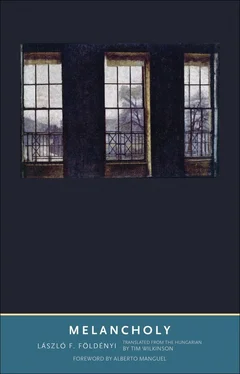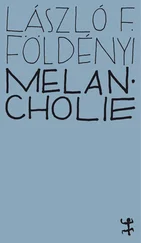Modern thinking marks its start from Kant, and the two paths that took him as their starting points so exclude each other that when their followers seek to refute one another, they are usually reduced to stumbling in the dark. Since the evolution of modern reality substantiated Kant’s “pessimistic” thinking and rendered it doubtful that human self-creation would lead to a harmonious community of free individuals, theoretical disputes in philosophy, after Hegel’s appearance, were characterized by the fact that whereas Romantics (melancholics) had based their arguments on the practical experience and cognition of reality, ideologues 6called them to account for promoting some kind of utopian idea of society (ignoring the fact that a utopia would be, just as much as reality was, a breeding ground for melancholia). Hitherto it had been perceptible, but from that point on it became obvious that there was no point of contact between the reality of melancholia and the ideology that condemned it: words just kept passing by one another, and the charges leveled against melancholia were subjected to the laws of the schematism denoted by Kant — they did violence to the object in order to be able to pronounce judgment on it. Disputing melancholic subjectivism and finding fault with it, Hegel attempted to show Kant’s tenets in a positive light. He tried to create a harmony between the individual conscience and absolute, general knowledge in which the individual’s finite and unique spirit could dissolve completely in the realm of the infinite spirit. But Hegel did not so much as attempt seriously to differentiate the finite and infinite spirit, and therefore he was also unable to express appropriately the value of uniqueness: that was the price he had to pay for eliminating the melancholic “subjectivism” of Kantian ethics. For that reason, the Romanticism that he rejected could have no role within his system: Hegel shaped reality into a monumental arch (pleasing and aesthetically entrancing though it may be in its own way, of course) in which only the transitions form “solid” footholds, but those autonomous (matchless, irreplaceable, unique) phenomena out of which one’s own life largely consists could not have any independent, absolute value. Kant believed in the absolute value of individual lives even though their realization — and the lives of numerous Romantics are proof of this — could be consummated only beyond the bounds of this earthly life, in death. Hegel had no such ambitious pretensions. Admittedly, he declared that free persons would regain their senses in one another’s freedom, and for an imaginary society, nothing could be more desirable than that. But autonomy, the possibility of which was developed by that same European culture that also provided the means for the Hegelian abolition of autonomy, dissolved irrevocably and became uninteresting in the Hegelian system. Hegel reproached the Romantic and melancholic Novalis for lacking a firm “bearing,” but actually, the main negative feature of his system was that the individual had no need of bearing in the Hegelian world structure: the individual was supported by the system, by the bridge of mediations. If Novalis jumped into the dark from that bridge of individual lack of bearing, then that was exactly a proof of bearing — a bearing that, entertaining no hope of the system, of its alleged totality, tried to be exclusively master of itself.
One has the impression that philosophy and life were conducting a debate; and looking at it from the viewpoint of ordinary life, Hegel’s polemic with the Romantics genuinely seemed to prove the rift of theory and practice. The role of philosophy, however, was much more a matter of life and death and cut much more to the quick than one might think today from the indigestible mass of textbook extracts. In its own way, classical German philosophy was as much an attitude toward fate as was the individual life and death of melancholic, prematurely deceased Romantics. “The mind is forever seeking to justify itself,” said Novalis, sensitive as he was to philosophy (Novalis, Ausgewählte Werke , 3:5). True philosophy is not a specialist branch of learning but an existential inquiry, or to use the words of Socrates, it is a preparation for death. Nowadays, the shock effect that contemporary philosophy had on the Romantics is almost incomprehensible. After reading Kant, Heinrich von Kleist suffered a breakdown, and melancholia overcame him; he drifted into such a creative crisis that he almost regarded his own existence as senseless. “Not long ago I made my acquaintance with the new, so-called Kantian philosophy,” he wrote to his fiancée, Wilhelmine von Zenge, on 22 March 1801. Then he resorted to the example of a pair of green eyeglasses to explain his despair: “If everyone saw the world through green glasses then they would be forced to judge that everything they saw was green, and we could never be sure whether our eyes see things as they really are, or whether they add something which pertains to the eyes not the objects. The same goes for the intellect” (Kleist, Werke und Briefe , 4:202).
Kleist asserted nothing less than that the only one capable of seeing things in their true reality was he who has no need of eyes as a means of seeing. To see, but without the contingency of earthly eyes — only a god could be capable of that. Or a melancholic, who saw through the surface of things, the way melancholic Kleist saw through everything. “Ah, there exists a sorry state of clarity,” he wrote to his half sister Ulrike on 5 February 1801, “from which nature has luckily spared people who see merely the surface of things. It shows me the thought behind every facial expression, the true meaning of words, and the motive behind action — everything around me, including myself, in its entire bareness, and my heart is starting to grow disgusted with that nakedness.” He wrote the following lines to Ulrike too: “The thought shook the sanctum of my soul, that we know nothing, absolutely nothing, about reality; that after death what we call truth here we shall call something else entirely, and consequently it is totally futile and fruitless to strive to acquire something that will follow us into the grave” (Kleist, Werke und Briefe , 4:202–3). Kleist thought his way carefully and consistently through Kant’s doubt about the knowability of reality; he hit upon a basic paradox of human existence: human cognition and the object that is to be recognized are inseparable from each other; we do not simply relate to an “external” reality, but are responsible for that reality.
By advising the Romantics that an individual is in reality whatever he makes himself out to be in reality, in practice, Hegel offered us sturdy footholds, but since he dissolved unique, irreplaceable individuality in totality, the reality he offered was one without man, one that would grow over man as a reality to which the individual could assimilate but essentially be unable to influence. Hegel disputed the absolute sovereignty of the individual, but in his hands the apparently solid category of “reality” was no more than the most characteristic feature of the modern world, which stifled individuality and had been placed in parentheses by the Romantics. What had bewitched and paralyzed the Romantics was the fact that there was no solid foothold beyond the ego. Prejudices, thoughts that had been digested or chewed over by others, became nullities for them just as uninteresting as the boundaries of existence “beyond” man. Novalis, by his own admission, was “enchanted” by Fichte’s philosophy, and with an almost Hegelian sensibility, called the philosopher the most dangerous of thinkers. Fichte considered being ( Sein ) and activity ( Tätigkeit ) to be identical, and thus for him reality was not a neutral object to be conquered but something created by man. Hegel said man was whatever he made himself in “reality,” but according to Fichte, man was what he made of himself — and along with the term “reality,” any accommodation or adjustment to reality was dropped from the sentence. Man was identical with his own possibilities , said Fichte by way of an answer to the Hegelian thought that man had to realize himself within reality. Actually, the Hegelian way of thinking was not “true to reality,” “real,” or even a “normal” way of thinking, but much more a system of prejudices that, having accepted and acquiesced in the structure of the existing world, presumed that the essence of man lay in complying with his circumstances. Although Hegel and philosophers who followed in his footsteps tried to differentiate between real and abstract possibilities, for the Romantics (primarily those of German background), who regarded the world not as finite but as contingent and transitory, drawing that distinction was no more than devious long-windedness; when Fichte and the Romantics (or later, Kierkegaard) held possibility to be more important than reality, it was not a matter of lack of basis, feverish daydreaming, or schizophrenia, but of the perception imbedded in melancholia that man was not born to accept the world but to create it.
Читать дальше












